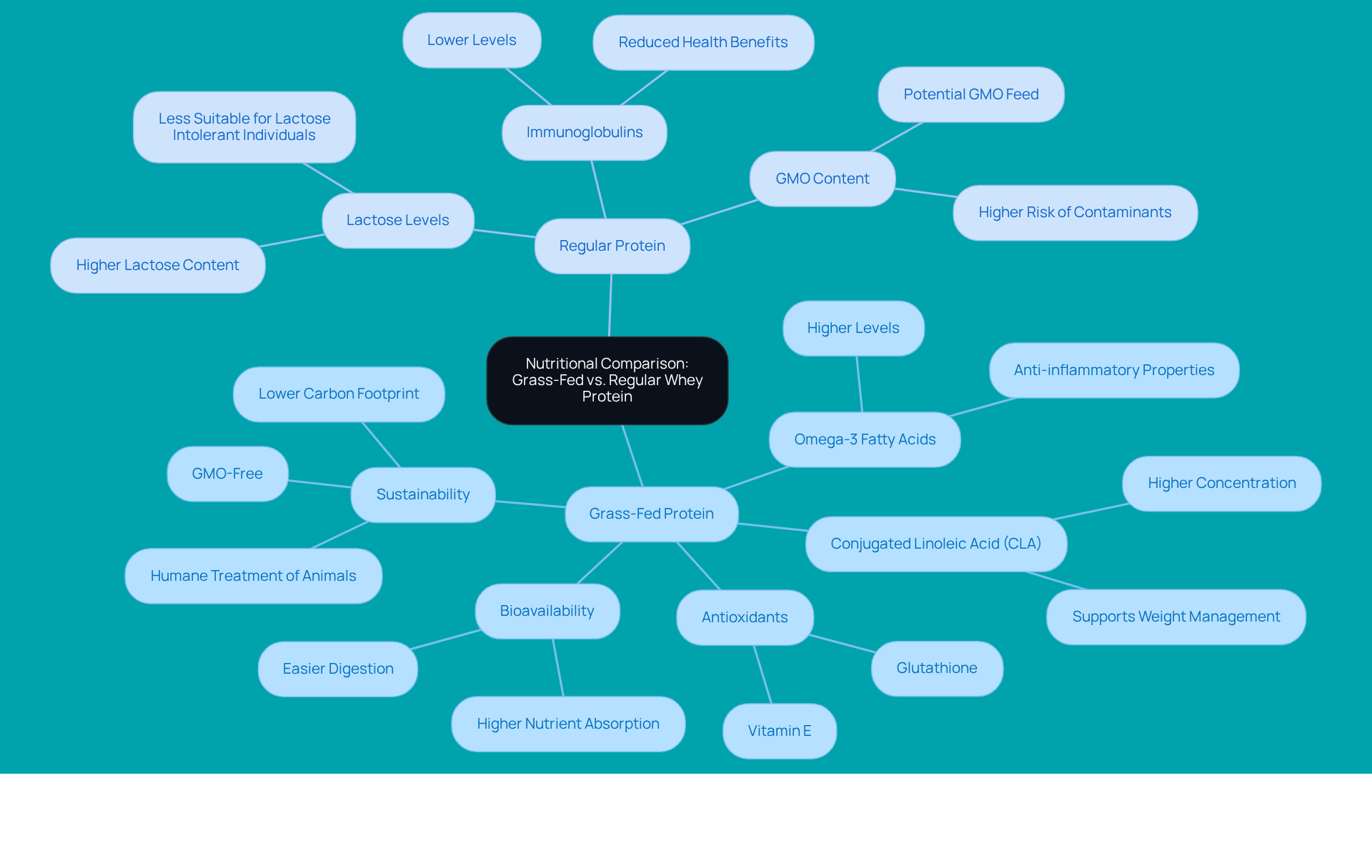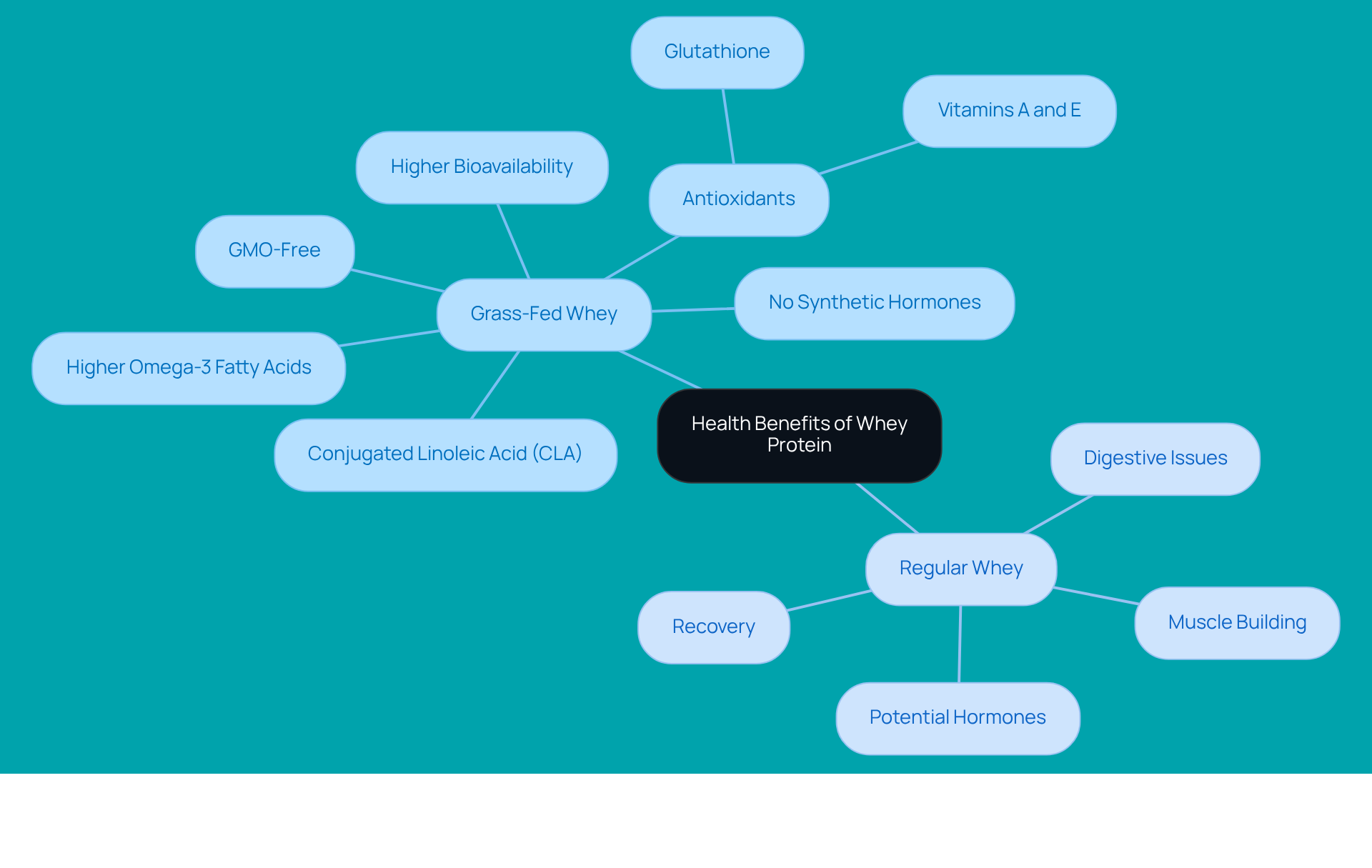Overview
Grass-fed whey protein isolate stands apart from regular whey protein, primarily due to its source—cows that are mainly grass-fed. This choice leads to a superior nutritional profile, boasting higher levels of omega-3 fatty acids and conjugated linoleic acid (CLA). Imagine if you could enhance your health simply by choosing a protein that aligns with your values. These beneficial compounds contribute to health advantages such as improved fat metabolism and muscle preservation.
You might be wondering how this impacts your wellness journey. The article highlights not only the nutritional benefits but also the ethical and sustainable farming practices associated with grass-fed options. By choosing grass-fed whey protein isolate, you are supporting a healthier lifestyle and a more sustainable future for our planet. Together, we can make choices that benefit both our bodies and the environment.
Introduction
The discussion surrounding grass-fed whey protein isolate versus its regular counterpart has truly resonated with health enthusiasts and nutritionists alike. With its nutritional profile showcasing higher levels of omega-3 fatty acids and conjugated linoleic acid (CLA), grass-fed options not only promise enhanced health benefits but also advocate for a more ethical approach to dairy sourcing. You might be wondering, though: is the premium price tag truly justified by the potential gains in health and sustainability? As we navigate this choice together, understanding the key differences can illuminate the path toward informed dietary decisions that align with our wellness goals.
Understanding Grass-Fed vs. Regular Whey Protein
Grass-fed whey protein isolate comes from cows that primarily enjoy a natural diet of grass and forage, which sets it apart from conventional dairy sourced from grain-fed cows. This essential difference in diet significantly enhances the nutritional profile of grass fed whey protein isolate derived from pasture-raised protein. You might be pleased to know that it results in higher levels of beneficial compounds like and conjugated linoleic acid (CLA). In fact, studies reveal that pasture-raised protein contains about 20% more omega-3s and 30% more CLA than standard protein—nutrients linked to numerous health advantages, such as improved fat metabolism and muscle preservation.
Imagine if you could enjoy dairy that not only supports your health but is also produced in a more humane and natural environment. Pasture-raised cows generally thrive in better conditions, which enhances the overall quality of the milk they produce. Moreover, the processing of pasture-raised protein often involves fewer additives and chemicals, aligning with the holistic health principles that many of us prioritize. Nutritionists emphasize that grass fed whey protein isolate supplements not only aid in muscle recovery and development but also deliver exceptional flavor and consistency, making them a beloved choice for health-conscious individuals.
Dr. Nessa Noronha, a respected authority in food for health, highlights that "Irish pasture-raised is viewed as more natural and sustainable," reflecting the growing consumer preference for such products. Real-world examples illustrate this trend, as more people are choosing pasture-raised protein to enhance their diets. Many report feeling a significant boost in energy levels and overall well-being after making the switch to pasture-raised options.
As one nutrition expert noted, the benefits of pasture-raised protein extend beyond personal health; they also promote sustainable agricultural practices that benefit our ecosystem and animal welfare. This increasing awareness among consumers underscores the importance of making informed dietary choices that align with both health goals and ethical values. Furthermore, with satisfaction guarantees available on many pasture-raised products, you can feel confident in your purchasing decisions, knowing that you are taking a positive step for your health and the planet.

Nutritional Comparison: Grass-Fed vs. Regular Whey Protein
Grass-fed dairy supplements stand out for their rich levels of omega-3 fatty acids, conjugated linoleic acid (CLA), and antioxidants like vitamin E and glutathione. You might be wondering how these differences can impact your health. Studies highlight that pasture-raised protein typically offers a more favorable omega-3 to omega-6 fatty acid balance, which is crucial for reducing inflammation and promoting heart health. This is especially important for those who are health-conscious and seeking natural solutions to wellness challenges.
In contrast, regular dairy supplements often contain higher lactose levels, making them less suitable for individuals with lactose intolerance. Imagine trying to enjoy a nutritious option, only to face discomfort afterward. Fortunately, pasture-raised protein is enriched with a broader array of bioactive substances that support immune function and overall well-being. Research indicates that these dairy-derived supplements have significantly higher levels of immunoglobulins and functional peptides, enhancing their health benefits compared to standard varieties.
Moreover, pasture-raised protein is naturally GMO-free and supports sustainable farming practices. This contributes to a and promotes humane treatment of animals, aligning with the values of many health-conscious consumers. Its higher bioavailability and digestibility make it an excellent choice for those with gastrointestinal sensitivities.
As you consider your options, remember that choosing grass fed whey protein isolate not only supports your health but also aligns with a compassionate approach to food sourcing. Together, we can make mindful choices that benefit our bodies and the planet.

Health Benefits of Grass-Fed and Regular Whey Protein
When it comes to choosing dairy supplements, both pasture-raised and standard options offer a range of health benefits that can support your wellness journey. You might be looking for ways to enhance muscle development, control your weight, or improve recovery after workouts. If so, you’ll be pleased to know that grass fed whey protein isolate is particularly recognized for its higher levels of bioactive compounds, including omega-3 fatty acids and antioxidants. These nutrients can play a crucial role in boosting immune function and reducing inflammation.
Imagine the benefits of conjugated linoleic acid (CLA) found in pasture-raised milk, which has been linked to improved body composition and fat reduction. Research indicates that individuals consuming pasture-raised milk isolate may experience enhanced muscle synthesis—some studies even suggest a 20% increase compared to those using standard milk isolate. However, it's always wise to consult specific studies for confirmation.
While regular dairy supplements can still effectively support muscle building and recovery, they may not provide the same level of . Additionally, many standard options may contain synthetic growth hormones, which pasture-raised dairy does not. This makes pasture-raised products a more appealing choice for those who prioritize natural nutrition. Plus, supplements like grass fed whey protein isolate are naturally GMO-free, aligning with the values of health-conscious consumers.
Ultimately, the decision between these two options should reflect your personal health goals, dietary restrictions, and budget considerations. We understand that making the right choice can feel overwhelming, but remember that you’re not alone in this journey. Together, let’s explore what works best for you and your wellness aspirations.

Drawbacks and Considerations: Grass-Fed vs. Regular Whey Protein
Grass-fed whey protein isolate supplements often stand out for their enhanced nutritional benefits, but it's important to acknowledge that they typically come at a higher price point—averaging around $2 per serving compared to $1.34 for traditional options. For those of us who are mindful of our budgets, this price difference can be a significant consideration. You might be wondering how this impacts your choices.
Moreover, many people find that grass fed whey protein isolate tends to have lower lactose levels, making it easier to digest than conventional protein. This can be particularly helpful for those who experience lactose sensitivity. On the flip side, conventional dairy-based supplements may include additives and synthetic ingredients that some prefer to avoid.
It's also worth noting that the production of grass fed whey protein isolate is generally more sustainable and ethical compared to standard protein sources. This raises important questions for environmentally conscious consumers about where their protein is sourced from.
As you navigate the decision between grass fed whey protein isolate and regular whey protein, consider weighing your dietary needs, budget limitations, and personal values. Together, we can make that align with our wellness journeys.

Conclusion
Choosing grass-fed whey protein isolate is not just a decision about nutrition; it's a step towards a more compassionate and healthier lifestyle. By opting for protein sourced from cows that graze on natural pastures, you not only benefit from higher levels of omega-3 fatty acids and conjugated linoleic acid but also contribute to better animal welfare and sustainable farming practices. This choice reflects a commitment to making informed dietary decisions that positively impact both your health and the environment.
Throughout this article, we’ve explored the numerous advantages of grass-fed whey protein isolate, such as its superior bioavailability, lower lactose content, and absence of synthetic additives. These qualities enhance digestion and overall health outcomes, making it a wonderful option for those of us who are health-conscious. While regular whey protein still offers benefits, it often falls short in these areas and may contain ingredients that could impede your wellness journey.
Ultimately, the choice between grass-fed and regular whey protein should resonate with your personal health objectives, dietary needs, and ethical values. Embracing grass-fed whey protein not only nurtures your well-being but also supports a more sustainable and compassionate food system. As we become more aware, let’s consider the broader implications of our choices and select products that align with our values. Together, we can pave the way for a healthier future for ourselves and our planet.
Frequently Asked Questions
What is the main difference between grass-fed whey protein isolate and regular whey protein?
Grass-fed whey protein isolate comes from cows that primarily eat a natural diet of grass and forage, while regular whey protein is sourced from grain-fed cows. This dietary difference enhances the nutritional profile of grass-fed whey protein.
What nutritional benefits does grass-fed whey protein provide?
Grass-fed whey protein contains higher levels of beneficial compounds such as omega-3 fatty acids and conjugated linoleic acid (CLA), with studies showing about 20% more omega-3s and 30% more CLA compared to standard protein.
How does grass-fed whey protein affect muscle recovery and development?
Grass-fed whey protein isolate supplements aid in muscle recovery and development, making them a popular choice among health-conscious individuals.
What are the ethical and environmental benefits of choosing grass-fed whey protein?
Grass-fed whey protein promotes sustainable agricultural practices, benefits animal welfare, and is produced in more humane and natural environments, aligning with ethical values and health goals.
Are there any additives or chemicals in grass-fed whey protein?
The processing of pasture-raised protein often involves fewer additives and chemicals, which aligns with holistic health principles.
What have consumers experienced after switching to pasture-raised protein?
Many consumers report feeling a significant boost in energy levels and overall well-being after switching to pasture-raised protein options.
Is there a satisfaction guarantee for pasture-raised products?
Yes, many pasture-raised products come with satisfaction guarantees, allowing consumers to feel confident in their purchasing decisions.




